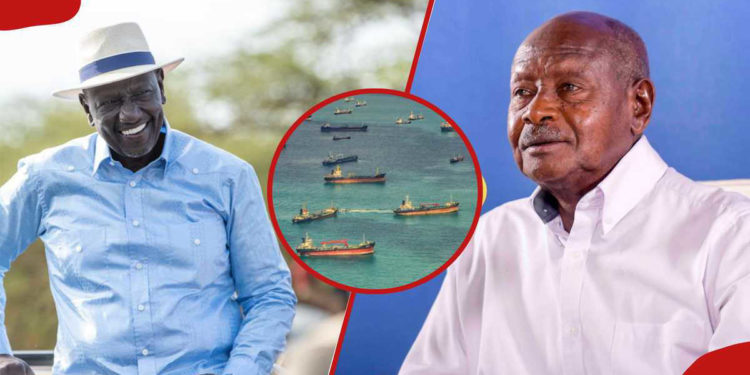In a startling development revealed this morning, the Museveni war threat Kenya Indian Ocean statement has sparked regional alarm. According to reports by The Star and other Kenyan media, Uganda’s President Yoweri Museveni warned that “in the future we’re going to have wars” over landlocked countries’ access to the Indian Ocean. The Museveni war threat Kenya Indian Ocean remarks came during a radio talk show at Mbale State Lodge. Moreover, they represent one of the most serious public confrontations between Uganda and Kenya in recent years.
President Museveni lamented that it is unfair to block landlocked countries from accessing a critical route to trade and strategic defense. Furthermore, he called the idea of countries claiming exclusive ownership of the ocean “madness.” The Museveni war threat Kenya Indian Ocean statement has raised diplomatic eyebrows across East Africa.
Why Uganda Needs Maritime Access
The statement stems from Uganda’s geographic reality. Uganda is a landlocked country with no direct access to the sea. Consequently, Uganda largely uses the port of Mombasa to access international markets. Therefore, any disruption to this access carries serious economic implications.
Using a metaphor of a condominium block, Museveni likened Africa’s geographic setup to a shared residence where all floors have equal rights to the compound. He argued it is unreasonable for coastal countries to claim exclusive ownership. Additionally, Museveni explained how difficult it is for Uganda to build a navy unit for self-defense. He stated: “In Uganda, even if you want to build a navy, how can you build it? We don’t have access to the sea.”
Historical Tensions Between Kenya and Uganda
The situation has deep historical roots. Uganda and Kenya have had long-standing disagreements over sea access. In the 1970s, Kenya blocked Uganda’s access following disputes with then-President Idi Amin. Amin claimed that sections of southern Sudan and western Kenya were once part of colonial Uganda.
Similarly, the border was again closed shortly after Museveni came to power in 1986. Moderate tensions over sea access and regional markets have persisted. The Uganda Railway was constructed from 1896 to 1901, connecting Mombasa to Kisumu on Lake Victoria. This railway has historically served as Uganda’s lifeline to the Indian Ocean. However, negotiations over infrastructure upgrades have been challenging.
Museveni noted: “That is why we have had endless discussions with Kenya. This one stops, another comes. The railway and the pipeline – we discuss.” These frustrations appear to have fueled the Museveni war threat Kenya Indian Ocean statement.
What This Means for East Africa
The remarks carry significant regional implications. Both countries are building a standard gauge railway link through Mombasa-Nairobi-Kampala-Kigali. Additionally, there have been proposals for oil pipelines connecting the countries. The statement puts these projects at risk.
However, analysts note several important facts. First, there are no verified reports of troop mobilizations or border closures. Second, Kenya and Uganda maintain substantial bilateral defense and economic ties. Third, both nations are members of the East African Community (EAC), which provides diplomatic frameworks for conflict resolution.
At a meeting in July 2025, Presidents Ruto and Museveni discussed persistent non-tariff barriers. They signed agreements on eight areas including trade, energy, and transport. Nevertheless, the recent Museveni war threat Kenya Indian Ocean statement suggests underlying tensions persist.
Kenya’s Diplomatic Response
As of now, Kenyan diplomatic channels have not issued a full public response to the statement. Nevertheless, diplomats in Nairobi are reportedly monitoring the situation closely. They are assessing whether the rhetoric represents a calibrated warning or signals more serious intentions.
Kenya holds strategic leverage in this situation. The country controls critical port infrastructure at Mombasa. Furthermore, Kenya can grant or restrict Uganda’s port access and pipeline transit rights. Therefore, any breakdown in trust could carry significant economic and security consequences for both nations.















